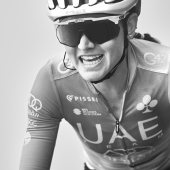Škoda Reworked the 'Bicycle Face' Myth to Support Women's Cycling
Join us on May 24 in NYC @ State of Play: 2023 Clio Sports Marketing Summit for a closer look at top creative ideas. You'll hear from agencies, teams and advertisers, including Michelob Ultra and Frito-Lay, about how they're using innovation, advocacy and engagement to build brand affinity with sports fans. Register Now.
Every once in a while, you encounter some social propaganda from the past that flummoxes you—not because people fell for it, but because it was tried. Who had the gall?
In 2023, Škoda in Spain served as the official sponsor for La Vuelta Femenina, an historic women's cycling race. This marked the first time the event, part of the UCI Women's World Tour, was held under a new name, with increased visibility designed to put it on par with Spanish men's competitions.
To promote Škoda's sponsorship, and its commitment to women's cycling, Proximity Barcelona unearthed a weird old myth: "Bicycle Face."
This is "a horrifying story about a fake illness that was invented in the 19th century to scare women and stop them from cycling—'bicycle face,'" Proximity Barcelona creative director Anna Soler tells Muse, "another failed attempt to stop women from being more independent and free. We turned the campaign into a celebration of the failure of all these men trying to stop women on two wheels in the most surreal ways by redefining, in a positive way, the meaning of Bicycle Face during the first la Vuelta Femenina cycling competition."
In the 19th century, cycling gave women a wider range of freedom. It was literally revolutionary—they could ride far from their own neighborhoods, without permission, or accompanied by someone to ensure their safety. Suffragettes embraced bicycles as a symbol of their movement.
Ultimately, however, doctors invented Bicycle Face, a "disease" where bike-riding women supposedly got dark shadows under their eyes and formed masculine facial traits. Soon, women's cycling was linked to depression, difficulty breastfeeding and miscarriages—basically, badmotherism.
Proximity turned such tripe on it head, remaking the sexist trope to empower women and epitomize equality.
First, let's consider the broader cultural context. The 2023 La Vuelta Femenina is historic for a couple of reasons. It completed a years-long attempt to create a full women's Tour of Spain. It also took place a year after the return of the Women's Tour de France.
The latter also has a fraught, gendered history. In the 120 years that the Tour de France has existed, the women’s competition only ran from 1984-89 before shutting down for lack of financial interest. In 2015, Spain launched the La Madrid Challenge by La Vuelta (an early, less intensive iteration of La Vuelta Feminina). And last year, purportedly boosted by renewed interest in women’s cycling in Spain, the Women’s Tour de France finally returned.
With La Vuelta following just a year later, we're seeing a reinforcement of women's cycling's legitimacy. The sport now has three major tours, in Italy, France and Spain, just as men's cycling does.
Notably, La Vuelta Femenina's past iterations were held concurrently with the men’s Vuelta—making its popularity an uphill climb. This year, it took place in spring instead, giving it a fixed place in the competitive calendar that doesn't promote a popularity contest with the men's event.
The combination of post-Covid bicycle revival, plus La Vuelta Femenina, provided galvanizing moment for women's cycling in Spain. La Vuelta Femenina kicked off on May 1, in Torrevieja, and ended on May 7, with an ascent to the Covadonga Lakes.
At the heart of Škoda's campaign is the work of two sports photographers, Naike Ereñozaga and Laura Ortiz de Zárate, who shot the cyclists as they raced.
"For us, 'Bicycle Face' in 2023 means something very different: The face of concentration before starting the first time trial stage, the overexertion during the ascent to the Covadonga Lakes, the pain after a fall," Soler says. "We needed to look for photographers that had all the knowledge to turn all these faces into portraits during the competition. [Ereñozaga and Ortiz de Zárate are] two Spanish women specialized in cycling and sports photography, and are an exception in a field with much more male presence."
The "Bicycle Face" portraits were shared on Škoda’s social media, as well as on the social media of the photographers. The full project is visible at BicycleFace.es.
Lastly, if you're wondering what relationship Škoda—known to us as a car brand—has to cycling, Soler explains that, too. "The brand started by manufacturing bicycles, so its relationship to cycling is in its DNA," she says. "Skoda has actively supported women in sports, with the sponsorship of two women's football teams from La Liga. Being the sponsor of the first edition ever of La Vuelta Femenina and doing a campaign for the occasion made a lot of sense for the brand."
For the curious, this year's La Vuelta Femenina was won by Dutch rider Annemiek van Vleuten. Now that there are finally three major-stage races in women's cycling, she is the first to have won them all: La Vuelta Femenina, Tour de France Femmes, and Giro d'Italia Donne.
Campaign images appear below. Click to enlarge:





















